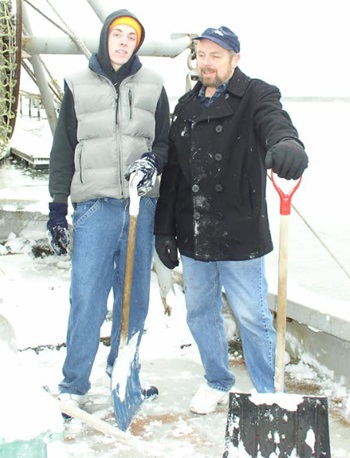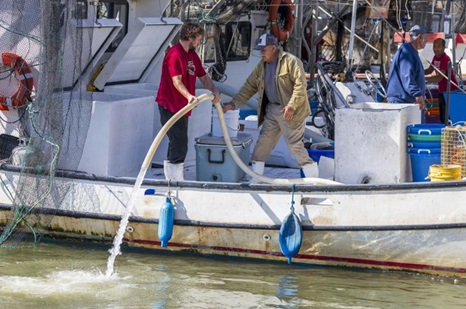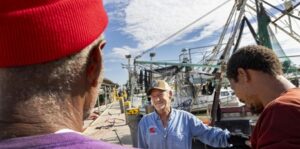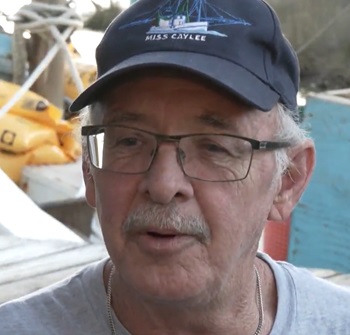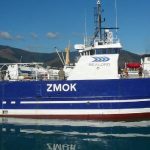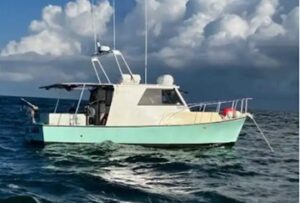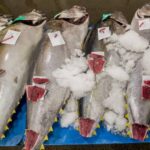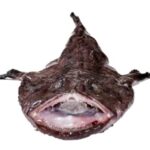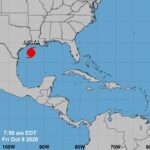Category Archives: Gulf of Mexico
‘We Need Our Docks!’: Shrimpers’ plea as county reconsiders lease
 The Trico shrimp docks on San Carlos Island remain abandoned, damaged, and tangled in a growing dispute over their future. These docks once served as a vital unloading point for pink Gulf shrimp, supporting the livelihoods of hundreds of people in Fort Myers Beach. Now, the area’s shrimping industry faces an uncertain path forward. “Well, we don’t have any place to dock or unload right now,” said Dennis Henderson, President of Trico Shrimp Company, recalling a time when the docks bustled with activity. Without access to these docks, however, the entire industry could shrink drastically. Video, photos, more, >>CLICK TO READ<< 14:41
The Trico shrimp docks on San Carlos Island remain abandoned, damaged, and tangled in a growing dispute over their future. These docks once served as a vital unloading point for pink Gulf shrimp, supporting the livelihoods of hundreds of people in Fort Myers Beach. Now, the area’s shrimping industry faces an uncertain path forward. “Well, we don’t have any place to dock or unload right now,” said Dennis Henderson, President of Trico Shrimp Company, recalling a time when the docks bustled with activity. Without access to these docks, however, the entire industry could shrink drastically. Video, photos, more, >>CLICK TO READ<< 14:41
‘Tariffs not enough’ to save U.S. shrimping industry
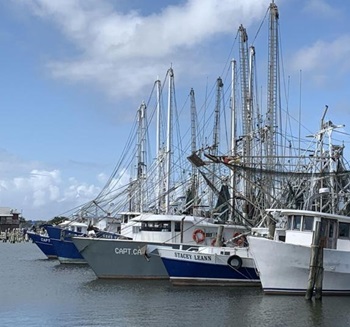 Alan Gibson, president of Tideland Seafood, summed up the frustration at a recent Louisiana Shrimp Task Force hearing in Houma. “Tariffs aren’t enough,” Gibson said. “The decrease in import prices is because of oversupply. They’re competing against each other to sell market share, and we’re fighting them, who are fighting each other.” Gibson called for a 25% import quota, saying it could reduce foreign competition enough to restore balance to the market. David Chauvin, a Louisiana-based seafood company owner, highlighted the disparity. Unlike tariffs, quotas directly limit the volume of imports, addressing the core issue of oversupply. By restricting imports, a quota could help stabilize domestic shrimp prices, allowing U.S. producers to compete more effectively. more, >>CLICK TO READ<< 16:58
Alan Gibson, president of Tideland Seafood, summed up the frustration at a recent Louisiana Shrimp Task Force hearing in Houma. “Tariffs aren’t enough,” Gibson said. “The decrease in import prices is because of oversupply. They’re competing against each other to sell market share, and we’re fighting them, who are fighting each other.” Gibson called for a 25% import quota, saying it could reduce foreign competition enough to restore balance to the market. David Chauvin, a Louisiana-based seafood company owner, highlighted the disparity. Unlike tariffs, quotas directly limit the volume of imports, addressing the core issue of oversupply. By restricting imports, a quota could help stabilize domestic shrimp prices, allowing U.S. producers to compete more effectively. more, >>CLICK TO READ<< 16:58
Athearn Marine Agency Boat of the Week: 62′ Steel Longliner with Permit, 400HP Cummins
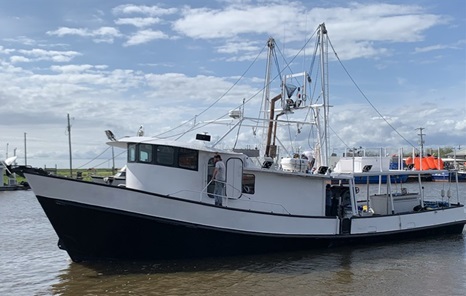 To review specifications, information, and 47 photos’, >click here<. To see all the boats in this series >click here< 06:00
To review specifications, information, and 47 photos’, >click here<. To see all the boats in this series >click here< 06:00
Mississippi Department of Marine Resources lobbying for state to put labels on Gulf shrimp
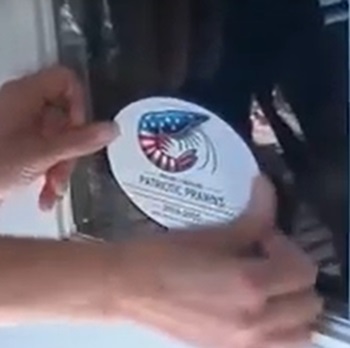 Mississippi’s seafood industry is pushing for legislation to require labeling for Gulf shrimp and seafood, following recent fines for mislabeling. Joe Spragin, executive director of the Mississippi Department of Marine Resources, emphasized that while some businesses do mislabel, many seafood providers strive to offer fresh, locally sourced products. Proposed legislation would mirror the catfish labeling law, ensuring consumers can identify domestic versus imported seafood. Spragin noted the importance of promoting locally sourced seafood, especially to tourists. Initiatives also include enhancing oyster aquaculture and monitoring environmental factors affecting seafood quality, aiming to support both consumers and local businesses. Video, >>CLICK TO WATCH<< 12:02
Mississippi’s seafood industry is pushing for legislation to require labeling for Gulf shrimp and seafood, following recent fines for mislabeling. Joe Spragin, executive director of the Mississippi Department of Marine Resources, emphasized that while some businesses do mislabel, many seafood providers strive to offer fresh, locally sourced products. Proposed legislation would mirror the catfish labeling law, ensuring consumers can identify domestic versus imported seafood. Spragin noted the importance of promoting locally sourced seafood, especially to tourists. Initiatives also include enhancing oyster aquaculture and monitoring environmental factors affecting seafood quality, aiming to support both consumers and local businesses. Video, >>CLICK TO WATCH<< 12:02
Some in seafood industry see Trump as fishermen’s friend, but tariffs could make for pricier fish
 The incoming administration of President-elect Donald Trump is likely to bring big changes for one of the oldest sectors of the U.S. economy, seafood, and some in the industry believe the returning president will be more responsive to its needs. Economic analysts paint a more complicated picture, as they fear Trump’s pending trade hostilities with major trading partners Canada and China could make an already pricy kind of protein more expensive to consumers. Conservationists also fear Trump’s emphasis on government deregulation could jeopardize fish stocks that are already in peril. But many in the commercial fishing and seafood processing industries said they are excited for Trump’s second presidency. They said they expect he’ll allow fishing in protected areas as he did in his first presidency, crack down on offshore wind expansion and cut back regulations they describe as burdensome. And they expect a marked shift from the administration of President Joe Biden, who prioritized ocean conservation and championed wind power from the start. Video, more, >>CLICK TO READ<< 10:26
The incoming administration of President-elect Donald Trump is likely to bring big changes for one of the oldest sectors of the U.S. economy, seafood, and some in the industry believe the returning president will be more responsive to its needs. Economic analysts paint a more complicated picture, as they fear Trump’s pending trade hostilities with major trading partners Canada and China could make an already pricy kind of protein more expensive to consumers. Conservationists also fear Trump’s emphasis on government deregulation could jeopardize fish stocks that are already in peril. But many in the commercial fishing and seafood processing industries said they are excited for Trump’s second presidency. They said they expect he’ll allow fishing in protected areas as he did in his first presidency, crack down on offshore wind expansion and cut back regulations they describe as burdensome. And they expect a marked shift from the administration of President Joe Biden, who prioritized ocean conservation and championed wind power from the start. Video, more, >>CLICK TO READ<< 10:26
‘Never seen anything like that’ | Southeast Texas shrimpers are left unhappy after contentious meeting with wind farm developer
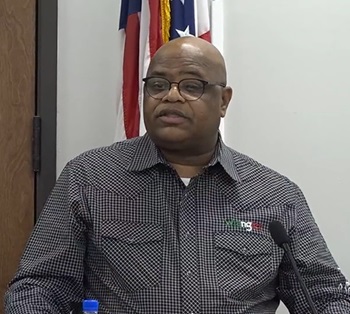 A community meeting hosted by Diligence Offshore about proposed wind turbines off the Port Arthur coast quickly dissolved into frustration when the company representative abruptly left without addressing local shrimper’s concerns. Aaron Crawford with Diligence Offshore addressed the room full of concerned citizens but left the room and declined to talk to 12News less than five minutes into the meeting. “That’s all I came to tell y’all tonight. God bless y’all. Can’t answer any questions because I have a big meeting coming up on the 17th,” said Crawford. The meeting drew criticism from local shrimpers and community members. Kyle Kimball, president of the Port Arthur Area Shrimpers Association, expressed his disbelief. Video, more, >>CLICK TO READ<< 07:06
A community meeting hosted by Diligence Offshore about proposed wind turbines off the Port Arthur coast quickly dissolved into frustration when the company representative abruptly left without addressing local shrimper’s concerns. Aaron Crawford with Diligence Offshore addressed the room full of concerned citizens but left the room and declined to talk to 12News less than five minutes into the meeting. “That’s all I came to tell y’all tonight. God bless y’all. Can’t answer any questions because I have a big meeting coming up on the 17th,” said Crawford. The meeting drew criticism from local shrimpers and community members. Kyle Kimball, president of the Port Arthur Area Shrimpers Association, expressed his disbelief. Video, more, >>CLICK TO READ<< 07:06
A Rebuttal to a Recent Commentary: Alaska trawl fisheries are vital and under attack by those using myths
 This campaign to ban trawling – a sustainable fishing method responsible for a substantial majority of fishery landings in the Alaska Region and nationally – poses a direct threat to Alaska’s coastal economy, seafood sector and way of life. If you enjoy wild seafood – fish sandwiches or shrimp; fish sticks or scallops; fish tacos or rockfish – you are enjoying seafood caught by “trawl” or “dredge” fishing gears that touch the seafloor. It’s true that these fishing methods, like every farm, aquaculture facility and fishing operation on the planet, impact the environment. But, what’s also true is that the impacts of trawl fishing in Alaska are continually monitored to ensure long-term ecosystem health. The recent commentary authored for the Alaska Beacon by Heather Sauyaq Jean Gordon and David Bayes is the latest effort to demonize sustainable trawl fisheries. Like other attacks on our sector, the commentary comes from a vocal few that play fast and loose with the facts. By Sam Wright, more, >>CLICK TO READ<< 11:43
This campaign to ban trawling – a sustainable fishing method responsible for a substantial majority of fishery landings in the Alaska Region and nationally – poses a direct threat to Alaska’s coastal economy, seafood sector and way of life. If you enjoy wild seafood – fish sandwiches or shrimp; fish sticks or scallops; fish tacos or rockfish – you are enjoying seafood caught by “trawl” or “dredge” fishing gears that touch the seafloor. It’s true that these fishing methods, like every farm, aquaculture facility and fishing operation on the planet, impact the environment. But, what’s also true is that the impacts of trawl fishing in Alaska are continually monitored to ensure long-term ecosystem health. The recent commentary authored for the Alaska Beacon by Heather Sauyaq Jean Gordon and David Bayes is the latest effort to demonize sustainable trawl fisheries. Like other attacks on our sector, the commentary comes from a vocal few that play fast and loose with the facts. By Sam Wright, more, >>CLICK TO READ<< 11:43
Athearn Marine Agency Boat of the Week: 44’11” Provincial Longliner Rod & Reel
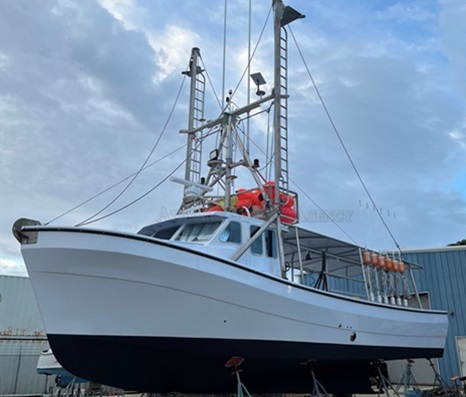 To review specifications, information, and 37 photos’, >click here<. To see all the boats in this series >click here< 06:21
To review specifications, information, and 37 photos’, >click here<. To see all the boats in this series >click here< 06:21
Shrimp sham: Investigation finds over 80% of “Gulf shrimp” sold on Mississippi Coast is imported
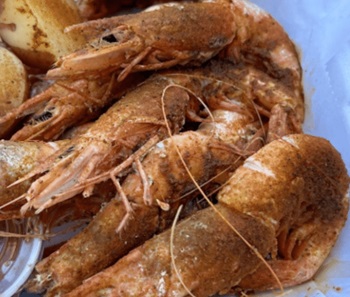 After Mississippi Gulf Coast staple restaurant Mary Mahoney’s Old French House came under fire for fraudulent branding of seafood, a new third-party investigation has found that mislabeling imported seafood is more rule than the exception for the region’s celebrated food scene. SeaD Consulting, a firm that specializes in genetic testing to monitor mislabeling and substitution fraud in the seafood industry, conducted a comprehensive investigation into the potential misrepresentation of shrimp served across coastal Mississippi. “Consumers come to the coast expecting the finest, freshest Gulf seafood, but what they’re being served often falls far short of that,” COO of SeaD Consulting Erin Williams said in a press release. “This isn’t just about mislabeling; it’s about eroding consumer trust, undercutting local business, and threatening the livelihood of hardworking Gulf shrimpers.” more, >>CLICK TO READ<< 10:56
After Mississippi Gulf Coast staple restaurant Mary Mahoney’s Old French House came under fire for fraudulent branding of seafood, a new third-party investigation has found that mislabeling imported seafood is more rule than the exception for the region’s celebrated food scene. SeaD Consulting, a firm that specializes in genetic testing to monitor mislabeling and substitution fraud in the seafood industry, conducted a comprehensive investigation into the potential misrepresentation of shrimp served across coastal Mississippi. “Consumers come to the coast expecting the finest, freshest Gulf seafood, but what they’re being served often falls far short of that,” COO of SeaD Consulting Erin Williams said in a press release. “This isn’t just about mislabeling; it’s about eroding consumer trust, undercutting local business, and threatening the livelihood of hardworking Gulf shrimpers.” more, >>CLICK TO READ<< 10:56Historic MS Coast boat is saved after captain’s death. His family has hopes for its future
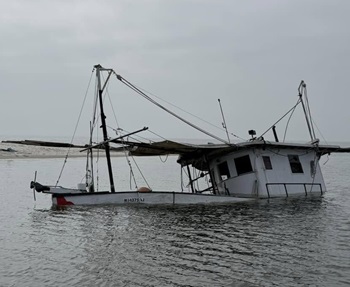 The Linda K sat for days near the shore of Deer Island, the water seeping in. It’s captain, esteemed shrimper Richard Kopszywa, died tragically last week after he went to work on the boat in the harbor. The 75-year-old devoted his days to restoring the historic vessel, and he never shrimped alone anymore, his family said. They do not know what happened. But through their grief, the Kopszywa family is determined to save the boat. One day, they hope to donate it to Biloxi’s Maritime and Seafood Industry Museum, where Kopszywa is in the Hall of Fame. “That’s the logical place,” said his wife, Shelley. “It has to go there.” lots of links, more, >>CLICK TO READ<< 06:48
The Linda K sat for days near the shore of Deer Island, the water seeping in. It’s captain, esteemed shrimper Richard Kopszywa, died tragically last week after he went to work on the boat in the harbor. The 75-year-old devoted his days to restoring the historic vessel, and he never shrimped alone anymore, his family said. They do not know what happened. But through their grief, the Kopszywa family is determined to save the boat. One day, they hope to donate it to Biloxi’s Maritime and Seafood Industry Museum, where Kopszywa is in the Hall of Fame. “That’s the logical place,” said his wife, Shelley. “It has to go there.” lots of links, more, >>CLICK TO READ<< 06:48
The Truth Behind the Menu: Study finds widespread mislabeled shrimp in Coast restaurants
 Docked shrimp boats, and empty factories. It’s a sight many in the shrimp industry are dealing with because of the imports flooding the market. “It’s really hard to stay in business, and to stay afloat,” says Ocean Springs Seafood Market Inc. Vice President Bethany Fayard. And it doesn’t help that restaurants are still advertising imported shrimp as domestic. “It’s a dying industry. We have let imports basically hurt the fisherman in Mississippi,” says State Representative Brent Anderson. A seafood consulting group known as SeaD was asked by an unnamed organization to look into this issue. The results were not entirely shocking to Fayard and Anderson, who both push for stricter labeling laws in the state. “In Biloxi, we have a situation which we weren’t coming in to test for, but we discovered quite rapidly, and that is the mislabeling of the Royal Red Shrimp,” says SeaD CEO David Williams. Video, more, >>CLICK TO READ<< 08:52
Docked shrimp boats, and empty factories. It’s a sight many in the shrimp industry are dealing with because of the imports flooding the market. “It’s really hard to stay in business, and to stay afloat,” says Ocean Springs Seafood Market Inc. Vice President Bethany Fayard. And it doesn’t help that restaurants are still advertising imported shrimp as domestic. “It’s a dying industry. We have let imports basically hurt the fisherman in Mississippi,” says State Representative Brent Anderson. A seafood consulting group known as SeaD was asked by an unnamed organization to look into this issue. The results were not entirely shocking to Fayard and Anderson, who both push for stricter labeling laws in the state. “In Biloxi, we have a situation which we weren’t coming in to test for, but we discovered quite rapidly, and that is the mislabeling of the Royal Red Shrimp,” says SeaD CEO David Williams. Video, more, >>CLICK TO READ<< 08:52
Louisiana Shrimpers face crisis as cheap imports threaten $1.3 billion industry
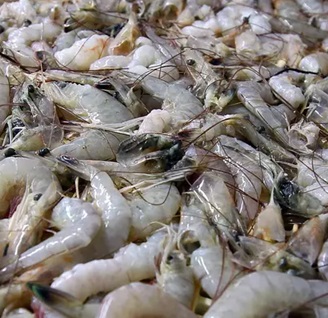 Louisiana’s shrimp industry, an essential part of the state’s economy and cultural identity, is under serious threat. A flood of cheap imported shrimp is driving prices to record lows, leaving local shrimpers fighting to survive. Without swift action, this generations-old way of life could vanish, taking with it jobs, traditions, and a vital piece of Louisiana’s coastal economy. Family-owned shrimping businesses, often passed down through generations, are struggling to stay afloat. The combination of plummeting prices and rising costs is forcing many to consider leaving the industry altogether. The potential collapse of the shrimping industry would devastate coastal towns like Grand Isle, Delcambre, and Pointe à la Hache, where much of the local economy depends on shrimping.
Louisiana’s shrimp industry, an essential part of the state’s economy and cultural identity, is under serious threat. A flood of cheap imported shrimp is driving prices to record lows, leaving local shrimpers fighting to survive. Without swift action, this generations-old way of life could vanish, taking with it jobs, traditions, and a vital piece of Louisiana’s coastal economy. Family-owned shrimping businesses, often passed down through generations, are struggling to stay afloat. The combination of plummeting prices and rising costs is forcing many to consider leaving the industry altogether. The potential collapse of the shrimping industry would devastate coastal towns like Grand Isle, Delcambre, and Pointe à la Hache, where much of the local economy depends on shrimping.
more,>>CLICK TO READ<< 08:52

Beloved MS Coast Hall of Fame shrimper remembered as kind, humble and ‘full of grace’
Day after day, Richard Kopszywa shrimped from his old wooden boat named F/V Linda K, and carefully repaired it so the vessel still ran after decades. “He used to tell me, ‘If I can’t shrimp or if I can’t get out on the water, I think I will probably just die,” his wife, Shelley Kopszywa, said. “It was in his veins.” Now, his family is grieving after authorities found Kopszywa near Deer Island last week, two days after his wife reported him missing and the Coast Guard found the Linda K empty, five miles from shore. Shelley Kopszywa said she believes her husband died doing what he loved, so she is at peace. Kopszywa was humble, his wife said, and probably would not have liked all this attention. But she loves him too much to listen. He was the kind of man who helped her down the steps, she said, and always opened the door for her. “Full of grace,” she said. more, >>CLICK TO READ<< 06:47
South Carolina shrimpers applaud decision to impose duties on shrimp imported from four countries
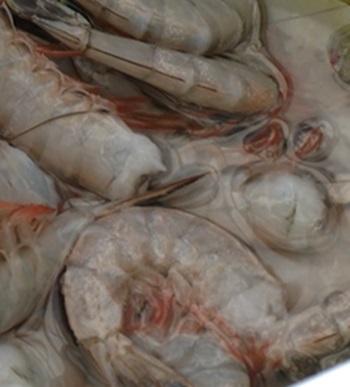 South Carolina shrimpers are celebrating the U.S. International Trade Commission’s recent decision to crack down on frozen shrimp imports from four countries. The ITC voted in favor of issuing countervailing duties on frozen, warm-water shrimp imports from Ecuador, India, and Vietnam after the U.S. Department of Commerce determined those governments were illegally subsidizing the industry. “We’re grateful because it’s an acknowledgment of what we feel and we experience in the industry and we see on a daily basis,” said Bryan Jones, a first-generation shrimper who lives in McClellanville. Jones serves as vice president of the South Carolina Shrimpers Association and was among a group of commercial fishermen who testified before the ITC in Washington, D.C. in October. more, >>CLICK TO READ<< 14:20
South Carolina shrimpers are celebrating the U.S. International Trade Commission’s recent decision to crack down on frozen shrimp imports from four countries. The ITC voted in favor of issuing countervailing duties on frozen, warm-water shrimp imports from Ecuador, India, and Vietnam after the U.S. Department of Commerce determined those governments were illegally subsidizing the industry. “We’re grateful because it’s an acknowledgment of what we feel and we experience in the industry and we see on a daily basis,” said Bryan Jones, a first-generation shrimper who lives in McClellanville. Jones serves as vice president of the South Carolina Shrimpers Association and was among a group of commercial fishermen who testified before the ITC in Washington, D.C. in October. more, >>CLICK TO READ<< 14:20
UPDATE: Body found in Biloxi identified as missing 75-year-old shrimper
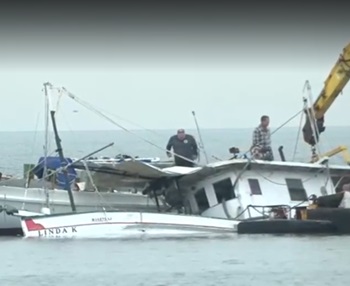 Harrison County Coroner Brian Switzer says the body found Tuesday morning between Biloxi Beach and Deer Island is missing shrimper Richard Kopszywa. The 75-year-old Biloxi man went missing from the F/V Linda K shrimp boat. The boat sank while being towed to shore near the western tip of Deer Island. Three days earlier, Ricky Kopszywa took his shrimp boat out to fill some last-minute orders for Thanksgiving, his family said. When his wife didn’t hear from him Sunday, she reported him missing. The Coast Guard found his boat, the Linda K, five miles offshore. The boat passed down from Ricky’s father was named after Ricky’s oldest sister. Video, more, >>CLICK TO READ<< 20:35
Harrison County Coroner Brian Switzer says the body found Tuesday morning between Biloxi Beach and Deer Island is missing shrimper Richard Kopszywa. The 75-year-old Biloxi man went missing from the F/V Linda K shrimp boat. The boat sank while being towed to shore near the western tip of Deer Island. Three days earlier, Ricky Kopszywa took his shrimp boat out to fill some last-minute orders for Thanksgiving, his family said. When his wife didn’t hear from him Sunday, she reported him missing. The Coast Guard found his boat, the Linda K, five miles offshore. The boat passed down from Ricky’s father was named after Ricky’s oldest sister. Video, more, >>CLICK TO READ<< 20:35
Coast Guard searching for 75-year-old shrimper after abandoned ship found off Biloxi coast
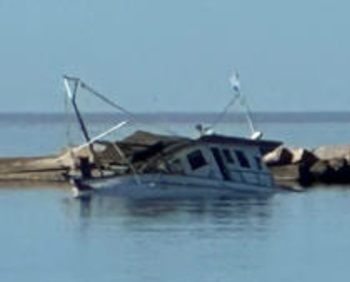 The U.S. Coast Guard is searching for a missing shrimper after his boat, the F/V Linda K, was found Sunday morning with no one on board. According to Ensign William Winston with the U.S. Coast Guard Mobile Station, the 75-year-old man was reported missing by his wife Sunday morning after she didn’t hear from him. The shrimper’s wife told officials he usually checks in daily when he’s out shrimping. The Coast Guard located the shrimp boat about five miles off the coast of Biloxi. The boat sunk while being towed to shore near the western tip of Deer Island. more, >>CLICK TO READ<< 06:18
The U.S. Coast Guard is searching for a missing shrimper after his boat, the F/V Linda K, was found Sunday morning with no one on board. According to Ensign William Winston with the U.S. Coast Guard Mobile Station, the 75-year-old man was reported missing by his wife Sunday morning after she didn’t hear from him. The shrimper’s wife told officials he usually checks in daily when he’s out shrimping. The Coast Guard located the shrimp boat about five miles off the coast of Biloxi. The boat sunk while being towed to shore near the western tip of Deer Island. more, >>CLICK TO READ<< 06:18
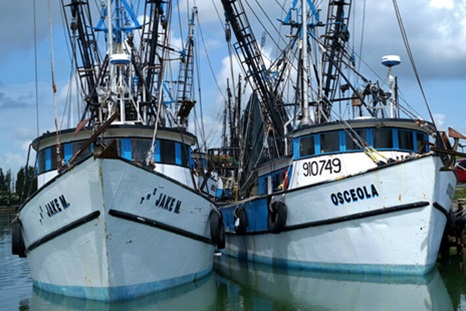
Struggling Valley shrimpers receive good news on new import measures
In an industry where bad news is the norm, shrimpers in Texas and elsewhere in the United States finally have a sliver of good news. The U.S. International Trade Commission, or ITC, on Tuesday determined that the U.S. shrimp industry is being “materially injured” by imports of frozen warm-water shrimp from Indonesia that the U.S. Department of Commerce says are being sold in this country at less than fair value, and also by shrimp imports from Ecuador, India and Vietnam that the Commerce Department says are being subsidized by the governments of those countries. As a result of the ITC’s determinations, the Commerce Department will issue “countervailing duty orders on imports of this product from Ecuador, India and Vietnam and an anti-dumping duty order on imports of this product from Indonesia,” the ITC announced Tuesday. more, >>CLICK TO READ<< 11:57
U.S. International Trade Commission votes in favor of antidumping, countervailing duties on shrimp imports
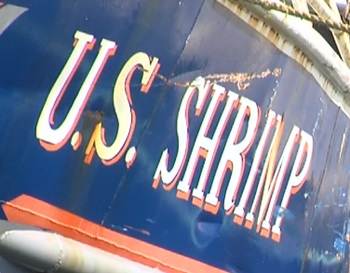 Southeast Texas fishermen are celebrating a win after the U.S. International Trade Commission voted in favor of antidumping and countervailing duties on shrimp imports from four countries. On Wednesday morning, the U.S. International Trade Commission voted in favor of antidumping and countervailing duty petitions filed by the American Shrimp Processors Association against imports of frozen warm-water shrimp from Ecuador, India, Indonesia, and Vietnam. As a result of the commission’s vote, duties ranging from 2.84% to 221.82% will be imposed on imports of shrimp from the four countries. “We are thrilled with the outcome of today’s vote,” said Trey Pearson, president of ASPA. more, >>CLICK TO READ<< 13:19
Southeast Texas fishermen are celebrating a win after the U.S. International Trade Commission voted in favor of antidumping and countervailing duties on shrimp imports from four countries. On Wednesday morning, the U.S. International Trade Commission voted in favor of antidumping and countervailing duty petitions filed by the American Shrimp Processors Association against imports of frozen warm-water shrimp from Ecuador, India, Indonesia, and Vietnam. As a result of the commission’s vote, duties ranging from 2.84% to 221.82% will be imposed on imports of shrimp from the four countries. “We are thrilled with the outcome of today’s vote,” said Trey Pearson, president of ASPA. more, >>CLICK TO READ<< 13:19
‘Just Go Fishing’: Florida’s commercial fishermen getting back on the water
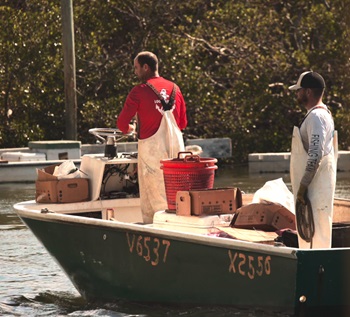 After being sidelined for more than a month following back-to-back hurricanes, the commercial fisherman in the historic Village of Cortez is back out hunting for grouper, blue crabs, bait fish, and everything in between. It was only a few days ago that Karen Bell, President of A.P. Bell Fish, said her team was able to go back out to sea and do what they love: fish. And the timing for some very bored fisherman couldn’t have been better. “All the grouper boats are out. They’ve only been out the last three or four days,” Bell said. The storms knocked Bell’s operations out for weeks. “A lot of damage. You know, I’ve got between my family and me, maybe 20 houses here, every one of them flooded, even mine, which sits high,” Bell said. “A.P. Bell’s roof is missing. It was like a double strike. At Star Fish, we lost all of our refrigeration equipment, the kitchens, the stoves, the ranges, and all the refrigeration stuff, so it took a little bit of time to get fixed.” more, >>CLICK TO READ<< 11:12
After being sidelined for more than a month following back-to-back hurricanes, the commercial fisherman in the historic Village of Cortez is back out hunting for grouper, blue crabs, bait fish, and everything in between. It was only a few days ago that Karen Bell, President of A.P. Bell Fish, said her team was able to go back out to sea and do what they love: fish. And the timing for some very bored fisherman couldn’t have been better. “All the grouper boats are out. They’ve only been out the last three or four days,” Bell said. The storms knocked Bell’s operations out for weeks. “A lot of damage. You know, I’ve got between my family and me, maybe 20 houses here, every one of them flooded, even mine, which sits high,” Bell said. “A.P. Bell’s roof is missing. It was like a double strike. At Star Fish, we lost all of our refrigeration equipment, the kitchens, the stoves, the ranges, and all the refrigeration stuff, so it took a little bit of time to get fixed.” more, >>CLICK TO READ<< 11:12

Donald Trump Pledges to Halt Big Wind Subsidies
Donald Trump’s election victory is quickly taking the wind out of the Biden administration’s ambitious renewables initiatives. President-elect Trump promised to end federal subsidies for offshore wind projects on his first day in office. As with many of his campaign pledges, Americans wait to see whether he will deliver. However, the market did not wait to see. Stock prices of offshore wind developers and turbine makers moved sharply downward following election day as investors query whether windmill projects are economically viable without the hefty federal subsidies Trump has promised to terminate. Environmental groups and fishermen have also raised concerns about the potential ecological trade-offs of this plastic-based technology and worries about ecotoxins created in the manufacturing of solar panels and EVs have caused consumers to pause. more, >>CLICK TO READ<< 10:22
Lawmakers demand review of U.S. Government Accountability Office’s oversight of shrimp imports
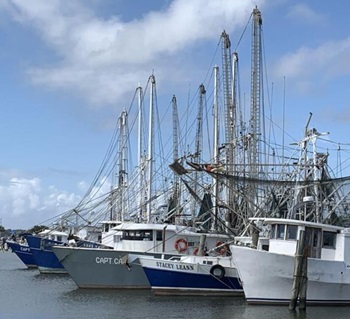 House Committee on Oversight and Accountability Chairman James Comer, R-Ky., U.S. Rep. Clay Higgins, R-La., and U.S. Rep. Troy Nehls, R-Texas, are calling on the U.S. Government Accountability Office to scrutinize whether the U.S. Treasury Department is fulfilling its legal obligation to protect American industries, including the shrimping sector, from international competition. The representatives voiced concerns in a letter sent to the GAO, suggesting that the Treasury may be neglecting statutory requirements that compel the department to oppose foreign economic assistance projects that could harm U.S. industries. more, >>CLICK TO READ<< 08:17
House Committee on Oversight and Accountability Chairman James Comer, R-Ky., U.S. Rep. Clay Higgins, R-La., and U.S. Rep. Troy Nehls, R-Texas, are calling on the U.S. Government Accountability Office to scrutinize whether the U.S. Treasury Department is fulfilling its legal obligation to protect American industries, including the shrimping sector, from international competition. The representatives voiced concerns in a letter sent to the GAO, suggesting that the Treasury may be neglecting statutory requirements that compel the department to oppose foreign economic assistance projects that could harm U.S. industries. more, >>CLICK TO READ<< 08:17

GOP Lawmakers, Fishermen Urge Trump to Keep Promise to Axe Offshore Wind
Trump’s return to the Oval Office may deal the problem-riddled offshore wind industry another blow if his administration follows through on his pledge to scrap federal support for offshore wind projects during his second term. Republican lawmakers, opposed to heavily subsidized green energy, and commercial fishermen, who view the industry as an existential threat to their livelihoods, are calling on the president-elect to follow through on his campaign’s promise, which could imply ending federal subsidies and lease sales for the industry. “The incoming administration has an historic opportunity to save American workers from foreign developers, reinvigorate iconic coastal towns, and improve America’s food security,” NEFSA CEO Jerry Leeman said in a press release following Trump’s election win. more, >>CLICK TO READ<< 06:54
Rafael now a tropical storm: Any threat to Alabama?
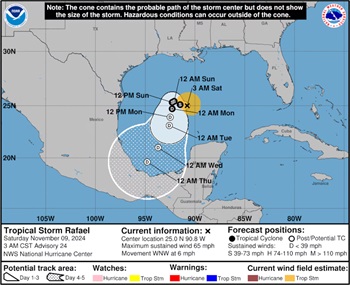 Rafael, a Category 3 hurricane just yesterday, has weakened rapidly to a tropical storm and had 65 mph winds on Saturday morning. The National Hurricane Center thinks the storm could drift southward over the Gulf of Mexico through the middle of next week. It could also continue to weaken and become a non-tropical system during that time. As of the last advisory, at 3 a.m. CST Saturday, Tropical Storm Rafael was located about 405 miles east of the mouth of the Rio Grande River and was moving to the west-northwest at 6 mph. more, >>CLICK TO READ<< 09:23
Rafael, a Category 3 hurricane just yesterday, has weakened rapidly to a tropical storm and had 65 mph winds on Saturday morning. The National Hurricane Center thinks the storm could drift southward over the Gulf of Mexico through the middle of next week. It could also continue to weaken and become a non-tropical system during that time. As of the last advisory, at 3 a.m. CST Saturday, Tropical Storm Rafael was located about 405 miles east of the mouth of the Rio Grande River and was moving to the west-northwest at 6 mph. more, >>CLICK TO READ<< 09:23
Charting a course toward seafood independence for Alaska’s vulnerable food systems
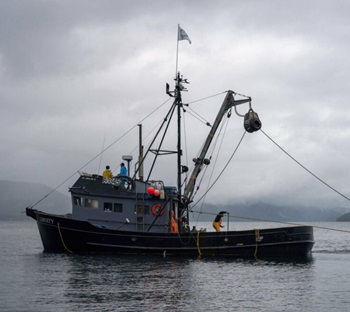 As a commercial fisherman based in Sitka and the executive director of the Alaska Longline Fishermen’s Association (ALFA), I’ve spent decades navigating Alaska’s challenging waters and the headwinds facing our fishing communities. Alaska’s coastal residents are resilient, but they are up against a new magnitude of challenges. The loss of fishing access and community-based processing capacity, along with a dearth of local markets for seafood, are straining once vibrant fishing economies up and down our coastline. I recently contributed to a fisheries access report commissioned by the Alaska Sustainable Fisheries Trust (ASFT), which highlights the outmigration of fishing access in Southeast Alaska. Communities with historically robust local fishing fleets now see few active vessels based in town. This trend is acute in communities such as Kake, which has lost its local processor — and with it, a viable market for resident fishermen. Through interviews and in-person engagement, ASFT’s report found that a common concern among fishermen was the loss of a local fish buyer. When this happens, resident fishermen often sell their permits or abandon fishing altogether. more, >>CLICK TO READ<< By Linda Behnken 12:05
As a commercial fisherman based in Sitka and the executive director of the Alaska Longline Fishermen’s Association (ALFA), I’ve spent decades navigating Alaska’s challenging waters and the headwinds facing our fishing communities. Alaska’s coastal residents are resilient, but they are up against a new magnitude of challenges. The loss of fishing access and community-based processing capacity, along with a dearth of local markets for seafood, are straining once vibrant fishing economies up and down our coastline. I recently contributed to a fisheries access report commissioned by the Alaska Sustainable Fisheries Trust (ASFT), which highlights the outmigration of fishing access in Southeast Alaska. Communities with historically robust local fishing fleets now see few active vessels based in town. This trend is acute in communities such as Kake, which has lost its local processor — and with it, a viable market for resident fishermen. Through interviews and in-person engagement, ASFT’s report found that a common concern among fishermen was the loss of a local fish buyer. When this happens, resident fishermen often sell their permits or abandon fishing altogether. more, >>CLICK TO READ<< By Linda Behnken 12:05
Southern Shrimp Alliance Welcomes NOAA Fisheries’ Confirmation that U.S. Wild-Caught Shrimp Is the Sustainable Choice
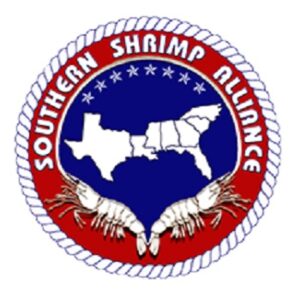 Last week, NOAA Fisheries published an on-line resource with facts regarding wild-caught American shrimp, explaining what makes it a sustainable seafood choice. Shrimp is, far and away, the most popular seafood in America. As NOAA Fisheries explains, “now about one-quarter of the seafood Americans eat is shrimp.” Yet, despite Americans’ love of shrimp, the U.S. shrimp industry is struggling. NOAA Fisheries notes that despite the fact that landings volumes were roughly the same in 2023 as they were in 2022, preliminary data from the Gulf of Mexico show that the industry sold $329 million of wild-caught shrimp in 2022 and that revenue dropped to $204 million in 2023 – a 38 percent drop.” more, >>CLICK TO READ<< 16:29
Last week, NOAA Fisheries published an on-line resource with facts regarding wild-caught American shrimp, explaining what makes it a sustainable seafood choice. Shrimp is, far and away, the most popular seafood in America. As NOAA Fisheries explains, “now about one-quarter of the seafood Americans eat is shrimp.” Yet, despite Americans’ love of shrimp, the U.S. shrimp industry is struggling. NOAA Fisheries notes that despite the fact that landings volumes were roughly the same in 2023 as they were in 2022, preliminary data from the Gulf of Mexico show that the industry sold $329 million of wild-caught shrimp in 2022 and that revenue dropped to $204 million in 2023 – a 38 percent drop.” more, >>CLICK TO READ<< 16:29






